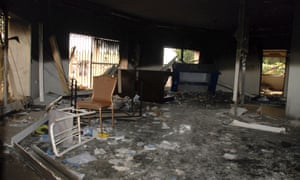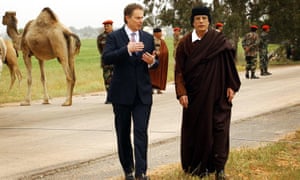Situation has deteriorated since David Cameron’s upbeat visit after Gaddafi fell, with latest administration on the brink.
On 15 September 2011 David Cameron flew into a newly liberated Tripoli with the then president of France, Nicolas Sarkozy, to be mobbed by rebels grateful for Nato airstrikes that had helped them secure victory over Muammar Gaddafi.
Beaming with delight in the sunshine, Cameron declared: “Your friends in Britain and France will stand with you as you build your country and build your democracy for the future.”
Back then, optimism was in the air. In rebel camps, coffee bars, hotels already jammed with foreign businesspeople – even amid the shattered concrete ruins ofGaddafi’s giant Bab al-Azizia compound – the talk was of progress.
As it turned out, everything.
Libya’s politics soon polarised into a battle dominated by the two most organised factions – Islamists on one side, and former regime figures on the other. But that polarisation comes with complicated cross-currents. The tribe is the basic political unit in Libya, creating an ever-changing tapestry of alliances and feuds.
Libyans have a saying: “In Libya it is region against region; in the regions, tribe against tribe; in the tribes, family against family.” The five years following the revolution gave grim confirmation to that proverb.
Libyans voted in massive numbers for the first transitional government, the general national congress (GNC). But hopes that this government could muddle through were shattered in September 2012 when jihadi gunmen over-ran the US consulate in Benghazi, murdering the US ambassador Chris Stevens and three others.

Terrorism, it became clear, was a post-revolution fact of life. In Tripoli, chaos reigned in parliament as the revolutionary dream rapidly turned into a nightmare. Powerful militias refused to disarm, instead establishing themselves as political players in their own right.
And Libyan politics remained trapped in the climate of suspicion and mistrust seeded by Gaddafi, who had kept power through more than four decades by setting tribe against tribe.
In 2014 the GNC fractured and, at the urging of Britain and other western states, Libyans voted for a new parliament – the house of representatives – and a new start. But anger and hostility dominated the election buildup.
Shortly before those elections, one diplomat complained that paranoia was now the order of the day among the factions. “They are all so terrified of each other,” he said.
The elections saw a sharp defeat for the Islamist-Misratan coalition, which then formed the Libya Dawn militia alliance and captured Tripoli. The rest of the new parliament, as divided among themselves as they were opposed to Libya Dawn,decamped to Tobruk, triggering the current civil war.
Britain has played a key role in Libya ever since Tony Blair’s 2004 meeting in the desert to welcome Gaddafi back into the international community.
British politicians and businesspeople, including Blair, took a leading role in helping Gaddafi invest his oil wealth. Gaddafi’s favoured son, Saif, made London his home, the London School of Economics happy to take his money.

When Nato went to war against Gaddafi in the revolution, the US took a back seat, with Britain and France sharing the leading role. But with the revolution over, Cameron walked away.
In London, few parliamentary debates on Libya were called by the government or the opposition, even though British bombing had done so much to create the country’s new order.
When last year the foreign affairs select committee called on Cameron to give evidence in its inquiry into British planning in Libya, he informed them he had no time in his schedule.
London finally woke up to Libya last year, with people smugglers taking advantage of the chaos to build a booming business – and with Islamic State on the march.
The UK, along with the US and Italy, is a prime mover behind the troubled government of national accord (GNA), created by a UN-chaired commission last December. Unelected and largely unloved, the GNA has failed to create a security force of its own, relying instead on militias that are also busy fighting each other.
The capture of key ports by the powerful eastern general Khalifa Haftar this week may have sealed the fate of this new government, now deprived of oil wealth.
All of which leaves Libya, in the words of Britain’s special envoy, Jonathan Powell – a veteran of Blair’s meeting with Gaddafi – veering towards becoming “Somalia on the Mediterranean”.
































